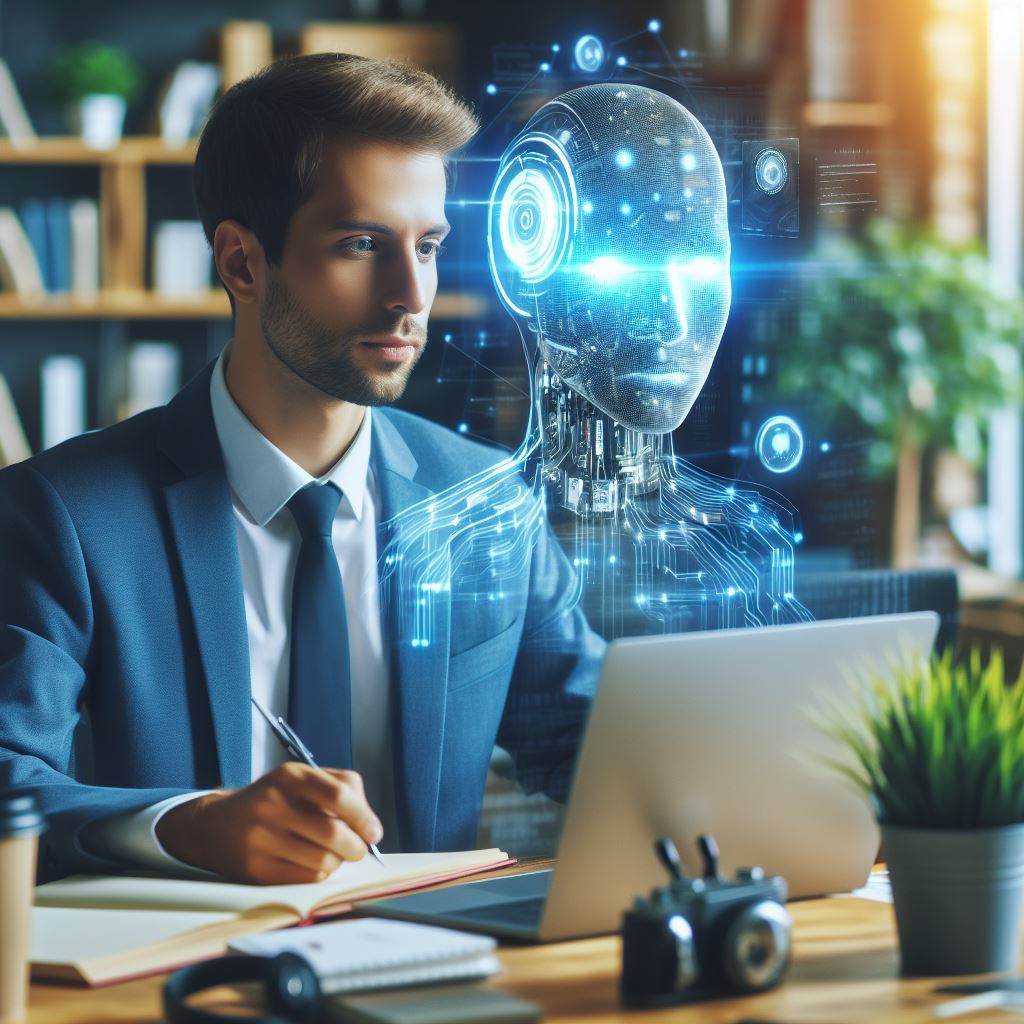Introduction
In today’s rapidly evolving landscape, AI’s integration across sectors is becoming more prevalent.
It’s transforming industries, driving innovation, and altering traditional job roles.
This rapid advancement has sparked both concern and interest regarding AI’s impact on employment.
As AI continues to evolve, certain professions are poised for significant changes.
Here’s a look at some key sectors where AI is expected to reshape the job market:
- Healthcare: AI is streamlining diagnostics, personalizing treatment plans, and enhancing patient care.
Roles like medical imaging specialists and healthcare administrators may see changes. - Finance: AI is revolutionizing financial services, from automated trading algorithms to personalized financial advice.
Jobs like financial analysts and investment bankers may evolve. - Manufacturing: AI-driven automation is improving efficiency and quality control in manufacturing.
Roles like production managers and assembly line workers may require new skills. - Customer Service: AI-powered chatbots are becoming more sophisticated, handling customer queries and support.
Customer service roles may shift towards managing and training AI systems. - Transportation: AI is driving advancements in autonomous vehicles and logistics optimization.
Roles like truck drivers and transportation planners may be affected. - Retail: AI is personalizing shopping experiences and optimizing supply chain management.
Retail jobs may involve more data analysis and customer interaction.
While AI’s impact on jobs is undeniable, it’s important to remember that it also creates new opportunities.
As AI technology continues to evolve, so too will the workforce, adapting to these changes and finding new ways to thrive in a more automated world.
The Nature of AI and Its Capabilities
What AI is and its current capabilities
AI, short for Artificial Intelligence, represents the simulation of human intelligence in machines.
Through sophisticated algorithms and data processing, AI systems can analyze vast amounts of information, recognize patterns, and make decisions or predictions.
AI encompasses several branches, including machine learning, natural language processing, computer vision, and robotics.
These technologies enable AI systems to perform a wide array of tasks that were once exclusive to human intelligence.
In today’s world, AI is omnipresent, powering virtual assistants like Siri and Alexa, recommending products on e-commerce platforms, filtering spam emails, and even diagnosing diseases.
Its applications span across industries, from healthcare and finance to transportation and entertainment.
One of AI’s remarkable capabilities is its ability to learn from data.
Machine learning algorithms allow AI systems to improve over time as they process more information, making them increasingly accurate and efficient in their tasks.
Moreover, AI has advanced to perform complex tasks such as image and speech recognition, language translation, autonomous driving, and even playing strategic games like chess and Go at a level surpassing human champions.
As AI technology continues to evolve, its capabilities are expected to expand even further, potentially revolutionizing entire industries and fundamentally changing the way we work and live.
Difference between AI augmentation and AI automation
AI augmentation and AI automation represent two distinct approaches to integrating AI into various processes and professions.
AI augmentation involves using AI to enhance human capabilities rather than replacing them entirely.
In this approach, AI acts as a supportive tool, assisting humans in decision-making, problem-solving, and completing tasks more efficiently.
Transform Your Career Today
Unlock a personalized career strategy that drives real results. Get tailored advice and a roadmap designed just for you.
Start NowFor example, AI-powered analytics tools can help professionals analyze complex data sets and make data-driven decisions faster and more accurately.
On the other hand, AI automation focuses on replacing human tasks with autonomous AI systems.
This approach aims to streamline processes, increase efficiency, and reduce the need for human intervention.
For instance, in manufacturing, robots equipped with AI algorithms can perform repetitive tasks on assembly lines with precision and consistency, eliminating the need for human workers in those roles.
Understanding the distinction between AI augmentation and AI automation is crucial for organizations and professionals navigating the integration of AI into their workflows.
While both approaches offer opportunities for improving productivity and efficiency, they have different implications for the workforce and require careful consideration in implementation.
Read: Lifelong Learning: Professions Requiring CEUs
Professions Likely to be Transformed by AI
In the rapidly changing landscape of the job market, there are certain professions that are expected to undergo significant transformations due to advancements in artificial intelligence (AI).
These changes are expected to impact various industries, including healthcare, manufacturing, retail, finance, and creative industries.
Let’s explore how AI will shape the future of these professions.
Healthcare
Healthcare is one of the sectors that will see a significant impact from AI.
With the ability to analyze vast amounts of data quickly and accurately, AI can assist in diagnostics, treatment planning, patient care, and streamlining administrative tasks.
For example, AI-powered algorithms can help doctors make more accurate diagnoses and develop personalized treatment plans based on individual patient data.
Manufacturing
In the manufacturing industry, AI is already being used to automate production lines and improve quality control processes.
By implementing AI-driven technologies, manufacturers can enhance efficiency, reduce errors, and minimize downtime.
This shift towards automation is expected to create a more streamlined and productive manufacturing environment.
Retail
Retail is another sector where AI is set to revolutionize operations.
AI-powered tools can optimize inventory management, forecasting demand, and providing personalized shopping experiences for customers.
By leveraging AI, retailers can offer tailored recommendations, improve customer satisfaction, and increase sales revenue.
Finance
In the finance industry, AI is making waves with algorithmic trading and risk assessment.
Transform Your Career Today
Unlock a personalized career strategy that drives real results. Get tailored advice and a roadmap designed just for you.
Start NowAI algorithms can analyze market trends, predict investment opportunities, and manage risks more efficiently than traditional methods.
This can lead to improved decision-making processes, higher profitability, and reduced human errors in financial transactions.
Creative Industries
Lastly, the creative industries are also not immune to the influence of AI.
Content generation tools and design automation software powered by AI can assist professionals in creating engaging content, designs, and visuals.
These AI-driven solutions are expected to enhance productivity, creativity, and innovation within the creative fields.
Overall, the integration of AI into various professions is set to bring about significant changes in the way work is done.
While there may be concerns about job displacement and skills gaps, there are also opportunities for new job roles, increased efficiency, and innovation.
It is crucial for professionals in these industries to adapt to the changing landscape by upskilling, embracing new technologies, and harnessing the power of AI to stay competitive in the evolving job market.
Read: Ethics First: Professions With Moral Codes
Professions Where AI Augments Rather Than Replaces
In the ever-evolving landscape of AI, there are several professions where artificial intelligence is playing a role in augmenting human capabilities rather than completely replacing them.
These professions include education, law, and engineering.
Education
In the field of education, AI is being utilized to create personalized learning experiences for students.
By analyzing data on individual learning styles and preferences, AI can tailor educational materials to meet the specific needs of each student.
Additionally, AI is being used for administrative automation tasks such as grading papers and managing student records, freeing up educators to focus on more strategic aspects of teaching.
Law
Within the legal profession, AI is being employed for tasks such as legal research and case prediction.
Algorithms can quickly analyze vast amounts of legal data to assist lawyers in building their cases and predicting potential outcomes.
However, when it comes to making nuanced judgments or interpreting complex legal principles, human lawyers are still essential.
Engineering
In the field of engineering, AI is being used for simulations and designs to enhance the overall efficiency and accuracy of projects.
By running simulations, engineers can test different scenarios and optimize designs before physically constructing them.
However, when it comes to making critical decisions on-site or addressing unexpected challenges, human engineers are needed to provide real-time solutions.
Transform Your Career Today
Unlock a personalized career strategy that drives real results. Get tailored advice and a roadmap designed just for you.
Start NowOverall, in these professions where AI augments rather than replaces, human expertise is still indispensable.
While AI can streamline processes and enhance productivity, there are certain aspects of these professions that require the unique skills and judgment of human professionals.
As AI continues to advance, it will be crucial for individuals in these fields to adapt and collaborate with AI technologies to maximize their potential and effectiveness.
Read: Millionaire Makers: Top Wealth-Building Careers

Skills and Qualities That Will Be in Demand
Critical thinking and problem-solving
In the era of AI, critical thinking and problem-solving skills will be the bedrock of success.
Employees must adeptly analyze complex data sets, discern patterns, and draw insightful conclusions.
With automation streamlining routine tasks, human ingenuity becomes the differentiator.
Companies will rely on employees to tackle novel challenges, innovate solutions, and navigate ambiguity with confidence.
Those proficient in critical thinking will excel in devising strategies, optimizing processes, and driving organizational growth.
Emotional intelligence and interpersonal skills
Emotional intelligence (EI) and interpersonal skills will emerge as essential competencies in the AI-driven workplace.
As machines handle repetitive tasks, human interactions become more pivotal.
Employees with high EI can effectively understand and manage their emotions, as well as navigate the emotions of others.
Such individuals excel in building rapport, fostering teamwork, and resolving conflicts constructively.
In a digitally connected world, the ability to empathize, communicate persuasively, and collaborate seamlessly will define professional success.
Adaptability and lifelong learning
In the dynamic landscape shaped by AI, adaptability and lifelong learning are indispensable virtues.
Professionals must embrace change as a constant and proactively seek opportunities for growth.
With technology evolving at a rapid pace, skill sets can quickly become obsolete.
Those committed to lifelong learning stay ahead of the curve by acquiring new knowledge and mastering emerging tools and techniques.
Adaptability allows individuals to pivot seamlessly in response to market shifts, organizational restructuring, or technological advancements.
In an era where the only constant is change, the ability to adapt and learn continuously becomes a competitive advantage.
Transform Your Career Today
Unlock a personalized career strategy that drives real results. Get tailored advice and a roadmap designed just for you.
Start NowRead: Who Wears Scrubs? Exploring Medical Professions
Preparing for the Future
In the evolving landscape of AI and jobs, it is essential for individuals, organizations, and policymakers to proactively prepare for the changes that lie ahead.
Here are some strategies to consider as we navigate this transformative period.
Education and Training
In the dynamic landscape of AI and job transformations, education and training play pivotal roles.
Traditional educational curriculums are evolving to prioritize STEM (Science, Technology, Engineering, and Mathematics) subjects.
These disciplines form the backbone of technological advancements and are essential for individuals to thrive in the AI-driven economy.
However, it’s not just about technical proficiency. Soft skills such as critical thinking, creativity, communication, and collaboration are equally important.
These skills enhance adaptability, allowing individuals to navigate complex work environments and effectively collaborate with AI systems and other professionals.
Educational institutions must adapt their curriculums to incorporate both STEM and soft skills.
By providing students with a well-rounded education that combines technical expertise with interpersonal abilities, they prepare them for the multifaceted demands of future jobs.
Policy Recommendations
Government and organizational policies play a crucial role in supporting workforce transitions amidst the rise of AI.
Policymakers need to recognize the importance of investing in retraining and upskilling programs.
These initiatives help displaced workers reskill for emerging job opportunities, ensuring economic resilience and reducing unemployment rates.
Furthermore, policies should incentivize businesses to prioritize employee training and development.
By offering tax breaks or subsidies for workforce education programs, organizations are encouraged to invest in their employees’ continuous learning.
Additionally, governments can facilitate partnerships between educational institutions and industries to align curriculums with current and future job market needs.
This collaboration ensures that educational programs remain relevant and equip individuals with the skills demanded by employers.
Individual Actions
In the era of AI disruption, individuals must take proactive steps to future-proof their careers.
Lifelong learning has become imperative as job roles evolve and new technologies emerge.
Embracing a mindset of continuous education allows individuals to stay ahead of the curve and remain competitive in the job market.
Transform Your Career Today
Unlock a personalized career strategy that drives real results. Get tailored advice and a roadmap designed just for you.
Start NowAdaptability is another key trait that individuals should cultivate.
Being open to change and willing to acquire new skills enables professionals to pivot seamlessly in response to evolving job requirements.
Flexibility and agility are essential attributes in an AI-driven economy where job roles are constantly shifting.
Moreover, individuals should prioritize developing a diverse skill set that encompasses both technical expertise and soft skills.
This combination enhances versatility and empowers individuals to excel in a variety of roles, including those augmented by AI technologies.
In a nutshell, by emphasizing STEM and soft skills in educational curriculums, implementing supportive policies, and adopting lifelong learning and adaptability as personal strategies, individuals can effectively prepare for the future of work in the age of AI.
Conclusion
Recapitulation of AI’s Impact
- AI has revolutionized industries, from healthcare to finance.
- Automation has streamlined tasks, boosting efficiency and productivity.
- Some jobs may be automated, but new roles will emerge.
- AI enhances decision-making, but human oversight remains crucial.
- Upskilling is vital to adapt to AI-driven changes.
Hopeful Outlook for Human-AI Collaboration
- AI augments human capabilities, creating new opportunities.
- Collaborative efforts lead to innovative solutions and growth.
- Humans bring creativity, empathy, and ethical judgment to AI.
- Job roles will evolve, requiring adaptability and continuous learning.
- Embracing AI fosters a dynamic and resilient workforce.
Encouragement for a Proactive Stance
- Understand AI’s capabilities and limitations for informed decisions.
- Embrace lifelong learning to stay relevant in evolving industries.
- Cultivate a growth mindset to adapt to changing job landscapes.
- Advocate for responsible AI development and deployment.
- Prepare for AI’s impact by developing versatile skills and networks.
In the end, the future of work with AI is promising.
By embracing change and fostering collaboration between humans and AI, we can create a more efficient, innovative, and inclusive workforce.
It’s time to embrace the future with optimism and readiness for the opportunities AI brings.
[E-Books for Sale]
The Big Book of 500 High-Paying Jobs in America: Unlock Your Earning Potential
$19.99 • 500 High-Paying Jobs • 330 pages
Explore 500 high-paying jobs in America and learn how to boost your career, earn more, and achieve success!
See All 500 High-Paying Jobs of this E-Book
1001 Professions Without a Degree: High-Paying American Jobs You Can Start Now
$19.99 • 1001 Professions Without a Degree • 174 pages
Discover 1001 high-paying jobs without a degree! Unlock career tips, skills, and success strategies for just $19.99!




